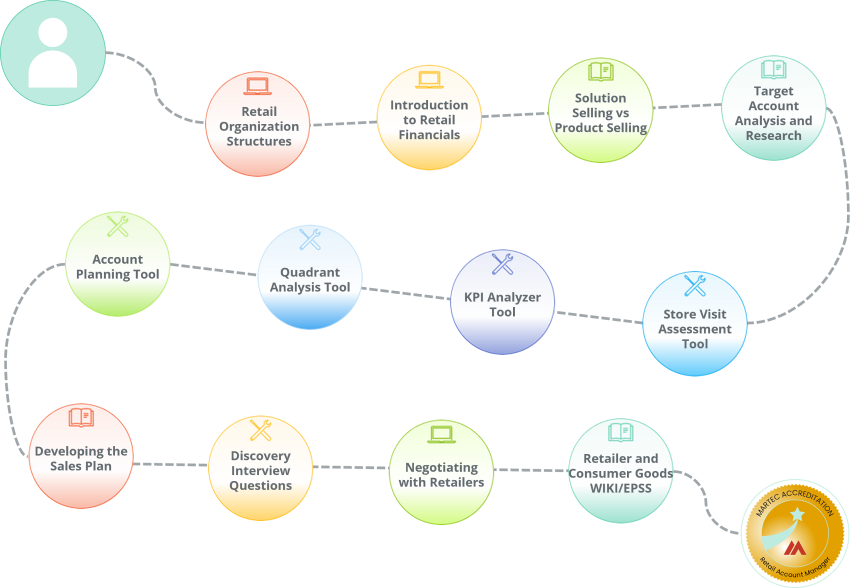Retail Account Manager Learning Path
Whether you’re an individual wanting to progress in an already established account management career or an executive looking to upskill your account teams, an account manager career path can help you achieve your objective.
A career in account management is especially suited to those who carry the motivation to drive revenue growth, enjoy building prominent client relationships and delivering client success. At Martec, all of our career paths are designed to support just that - being integral to driving the success of the client.
What can you expect from starting a career path with us? Let’s take a look.
Our Retail Account Manager Career Paths
With Martec’s account manager career path, learners have plenty of courses to advance their industry knowledge and account management skills.. From the retail organization course to more advanced classes, learners will develop valuable skills in account research and analysis, insight development, sales, solution development, negotiation, and more.

Learning Paths Explained
In the learning path diagram, circles contain either a computer, a tool, or a book symbol, representing the different methods of learning.

Computer Symbol:
This signals an e-learning class, which comes with its own mastery test at the end.

Book Symbol:
This denotes specific selections of content from the retail and consumer goods industry. In the learning management system, there will be a specific mastery test for each of these circles.

Tools Symbol:
This indicates downloadable job aids such as checklists and spreadsheets to guide certain types of analysis.
The learning path takes approximately 9.5 hours to study, but it is highly recommended to limit your study sessions to 30 to 45 minutes because this will help you to maximize memory retention and get the most out of the learning pathway.
In order to graduate each test, a 70% pass rate is needed. As the learner successfully passes each test, they will be rewarded with a digital badge. Once all the tests have been passed and graduated, a Learning Path digital badge will be granted.
Advancing Your Retail Career with Martec
Martec International is a team of global experts in advanced retail training and consumer goods courses. We bring more than 35 years’ experience and a trusted service to thousands of learners worldwide.
Why Learners Choose Us
With knowledge built across 38 different countries (with more to come!), we at Martec can adapt each course to suit local cultures.
On top of this, we are celebrated for our outstanding thought leadership, which shapes the delivery of our products, blogs, white papers, webinars, and job aids. Martec courses go beyond theory, offering actionable, first-hand knowledge of what really works for retail account managers.
1. Ask The Expert

All of our classes include an exclusive Ask the Expert link.
This link provides learners with the opportunity to seek further advice from subject matter experts, completely free of charge.
Martec aims to respond in 2 business days to all Ask the Expert queries, and there is no limit on how many questions a learner can ask.
2. Go At Your Own Pace

Martec’s e-learning classes are available 24/7, which means there is no pressure to complete the learning pathway in a limited length of time or at a certain time in the week.
This gives learners the freedom to complete the learning path when it suits them best because Martec understands that everybody has different schedules. Whilst learners have the freedom to study when they wish, we recommend studying for around 30 minutes a day to maximize learning potential.
For good measure, we have organized modules into a series of sub-topics that will last for 5 to 10 minutes. This means that if a learner wants to have a short burst of learning, they can do so without having to commit to longer sessions.
3. Mastery Test & Digital Badge

When learners complete the mastery test at the end of the program, they will be issued a digital badge.
This badge can be posted on LinkedIn or other platforms to showcase your or your team’s achievements.
Hunters vs Farmers
In your sales team, there will be hunters and farmers.
- Hunters are constantly seeking opportunities with new and unfamiliar leads.
- Meanwhile, farmers focus on cultivating existing long-term relationships with clients and seeking opportunities within existing accounts.
Hunters will thrive in roles where they can be independent, such as:
- Account executives
- Field representatives
- Business development managers
Whereas, farmers thrive in more relationship-nurturing roles - think:
- Account managers
- Customer service representatives
- Client success managers
To be successful as a Hunter or Farmer, you need to use a strategy of consultative selling. Typically, only 40% of the average sales force will be strong at both. Moving this number up to 50% or 60% can have a significant impact on sales performance.
To be a successful Farmer, you need to engage a wider circle of executives to open up sales opportunities. Farmers are tasked with maintaining continuous research on the account, bringing in new ideas that improve business performance and address emerging issues. They can work on longer time horizons than hunters.
Here at Martec, we embrace this dichotomy, giving learners the sales support they need to get ahead, no matter if they wish to pursue a more sales-led or account management career path.
Who Can Use Our Account Manager Learning Paths?
Our account manager learning path is designed for both sales executives and existing account managers looking to upskill and progress in their careers.
This learning path gives learners more comprehensive insight than the retail induction learning path. Therefore, we recommend that learners complete the induction courses first - or have the equivalent knowledge from past industry experience - before pursuing this more advanced series of courses.
How to Use Our Account Manager Learning Path
Our account manager learning path can be studied whilst working in an account manager role in your free time or whilst working in a junior role to improve prospects of a promotion.
Each step of the learning path is designed to deliver the necessary knowledge for the learner to perform the account manager role to the highest of their potential.
Additionally, our account manager learning path aims to equip learners to master key industry skills. It’s logical and easy to use, helping you to enhance your skills and efficiency.
Building a Successful Career as an Account Manager
A Retail Account Manager is responsible for managing relationships with key accounts in the retail sector to ensure that sales targets are achieved and customer satisfaction is maintained.
They act as the primary point of contact for retail accounts, identifying and communicating solutions to retail needs, handling negotiations, providing customer service, and managing the overall business relationship.
To be successful in this role you will need the following skills:
1. Sales skills

Retail Account Managers must have excellent sales skills to be able to identify sales opportunities and persuade customers to buy products or services. They must understand how retailers buy.
2. Communication skills

They must have strong communication skills to be able to build and maintain relationships with clients, negotiate contracts, and communicate effectively with team members.
3. Organizational skills

Retail Account Managers must be highly organized to keep track of multiple accounts, product lines, and deadlines. They must also understand the retail organization structure and engage the right executives in the sales process.
4. Analytical skills

They must be able to analyze the account's performance, financial and otherwise, using financial statements and the analysis of key performace indicators, market trends and competitor performance to develop effective sales strategies and identify new business opportunities.
5. Customer service skills

Retail Account Managers must be dedicated to providing excellent customer service to maintain and grow customer relationships.
6. Industry proficiency

They must have a deep understanding of their products and services and how they address a retailer's pain points. This is especially important for anyone using a solution selling approach.
7. Time management skills

They must be able to prioritize tasks and manage their time effectively to meet deadlines and achieve sales targets.
8. Competitive knowledge

They must be able to explain why their products and services will be a better fit for the client than the likely competitors.
Boost Your Retail Career with Martec
Martec International has become a go-to choice for learners across the globe seeking to advance their careers in the retail and consumer goods industries. With learners in nearly 60 countries, it’s our aim to continue to deliver outstanding skills development solutions that give learners real value.
So, what are you waiting for?
Get in touch with Martec today and start further developing your account manager career path with our learning pathway.
The Skills You Gain
By studying this learning path, consultants will gain these skills:
- Research the organization of a retail account and identify the key executive functions.
- Review a retailer's financial statements to identify trends, business challenges and suspect opportunities in the account.
- Perform target account analysis, identify further challenges, prioritize those that your company can address, and identify potential solutions.
- Develop a sales plan for the account to confirm whether suspect opportunities are real ones, determine whether product or solution selling approaches will work best, plan approaches to the relevant executives for those opportunities, start initiatives to get meetings, and in conjunction with pre-sales support, create a list of meeting discovery questions for each potential opportunity.
- Identify the quantifiable benefit areas for each opportunity.
- Plan a negotiating strategy with the account when the sales activities have proceeded far enough.
